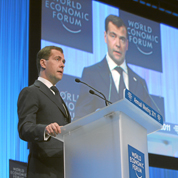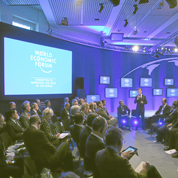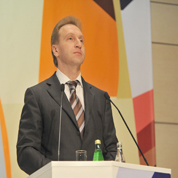Medvedev presents Russia’s resurgent postcrisis economy to Davos audience

It must be noted that most of the over 2,500 people in the audience representing ‘who is who’ in global business and politics were in much better moods at this year’s forum than they were this time in 2010, an evidence of the imminent end of the current global recession. Specifically, this positive sentiment was noted in a study report released on the eve of the forum by PricewaterhouseCoopers (PwC), which found that the confidence level among global CEOs was almost back to the precrisis level of 2007, with 48% of international CEOs polled for the study noting that they are now ‘very confident’ of business growth in the next 12 months, up from 31% in 2010.
Commenting on this positive trend, PwC International Chairman Dennis Nally said global CEOs have emerged from their ‘bunker mentality’ aimed at just surviving the recession at its peak. “Today, they now see a renewed opportunity for growth, even in the near term, and are determined to take advantage of better global economic conditions and increased customer demand.”
"The president was able to highlight Russia’s resurgent $1.5trln postcrisis economy that grew from almost minus 10% in 2009 to plus 4% in 2010 and its other competitive advantages as one of the best performing emerging market to the Davos audience.”
Medvedev’s speech was directed at tapping these positive sentiment trends to the maximum for Russian economy. Although the airport blast did occupy a prominent part of the speech, the president, however, was able to highlight Russia’s resurgent $1.5trln postcrisis economy that grew from almost minus 10% in 2009 to plus 4% in 2010 and its other competitive advantages as one of the best performing emerging market to the Davos audience.
Convincing ‘doubting Thomases’ among global investors on Russia
Indeed, this year’s forum was seen by the Kremlin strategists as a key part of Russia’s ongoing uphill battle of convincing global investors that endemic corruption, business-crushing red tape, inconsistent rule of law, security lapses, etc., are not all what the country, home to some of the world’s largest energy and natural resources, has to offer to international investors. This point has already been noted by several international CEOs, including BP, PepsiCo and several others, which on the eve of forum struck new strategic investment deals with local companies.
However, there are global CEOs that are still very much skeptical about Russia, its business potential and investment climate. Indeed, the scale of reputation problem faced by the president was underscored by the fact that a vast majority of delegates at this year’s Davos forum, asked in a poll to rank the BRIC countries in order of best investment attractiveness, unanimously placed Russia in the last position. Therefore, most parts of the president’s address were focused on convincing such ‘doubting Thomases’ among the global investors in the audience, who still have serious concerns — both justified and unjustified — over the economic justification of doing businesses in Russia.
Thus, in an attempt to convince this group of investors, Medvedev noted that his top priority task is to turn Russia into one of the world’s most business-friendly places for international investors. He also touched on his other key policy strategies, including the plans for executing sweeping reforms in the economy, social sector, law-enforcement agencies (police and court), state apparatus, etc., so as to boost Russia’s attractiveness and competitiveness on the global arena.  All these objectives are to be attained within the framework of modernization, the president’s key signature policy, which ran through his keynote address at the Davos forum, where he identified key priorities of his ambitious plan to completely overhaul Russia, making it a default financial hub for strategic global investors.
All these objectives are to be attained within the framework of modernization, the president’s key signature policy, which ran through his keynote address at the Davos forum, where he identified key priorities of his ambitious plan to completely overhaul Russia, making it a default financial hub for strategic global investors.
To start with, the president noted that the government will wind down its lopsidedly ‘excessive presence’ in the economy via privatization of its huge stakes in the nation’s largest corporations, from banking, transportation, some infrastructure assets to energy industries, a move that will create new business opportunities in the country. A practical realization of this objective has seen the government reducing the so-called list of strategic enterprises, previously declared ‘a no-go area’ for foreign ownerships, has been trimmed down by as much as 80%, thus making these lucrative sectors once again available for foreign investors and their capital.
Besides, the Kremlin plans to set up a special fund to reduce the enormous risks faced by foreign investors via the introduction of investment schemes that will be co-financed by foreign investors and the government. Another move designed to significantly boost the Russian market to foreign investors is the authorities’ pledge not to impose additional taxes on the financial sector so as to attract foreign investors facing draconian tax hikes in their native countries. The January 1 abolition of tax on the sale of shares tax also rhymes with this mission, just as the new investors friendly taxation legislation could also attract more of long-term, rather than volatile, speculative short-term capital to country and its stock bourses.
Another issue touched by the president is the goal to create a modern, Silicon Valley-styled high-tech hub in Skolkovo, a town on the Moscow suburbs, which will become the country’s new cradle for grooming new forms of entrepreneurship, cutting-edge scientific innovations and venture capitalism. This is because Skolkovo is expected to attract the best of technological expertise, international management gurus and top global industrial brands from all across the world to help pilot and develop projects capable of putting the country on the avant-garde of global technological innovations. To this end, the government needs foreign experts in all spheres of human endeavors to mitigate the acute shortage of competent personnel. As a result, the Kremlin has already radically relaxed the country’s excessively rigid migration requirements for some categories of foreign specialists to encourage an influx of qualified foreign professionals to Russia.
The ongoing huge investments into Internet and related technologies by both the Russian government and private businesses are also expected to create new business opportunities. “Improved Internet connectivity will make it easier for the business community to have direct contacts with all relevant government agencies, thus reducing corruption and other negative issues faced by investors in the country. “Besides, improvement in infrastructure, crucial to modernization and attracting foreign investments, is also on the agenda. This process will be boosted by the preparations toward hosting several large-scale international sporting events in country, such as the Sochi Olympics in 2014, debut of Formula One in 2014, the FIFA World Cup in 2018, etc. All these events are expected to give an additional boost to rapid infrastructure development in Russia,” the president said.
Stressing his willingness to learn and listen to friendly advice and recommendations from Russia’s well wishers, the president, however, openly made clear what he does not need from Russia’s international friends and partners - unnecessary lecturing on how to run his nation, build an effective democracy and implement corporate rules in the country.
The global audience reactions
Since Medvedev cut short his visit owing to the airport suicide bombing he was not available to personally hear all the reactions to his speech and those of other Russian delegates — both positive and negative — from the global CEOs in the audience at the subsequent discussion sessions, where he was replaced by Russia’s First Deputy Prime Minister Igor Shuvalov and other top Russian government and business officials.
“The scale of reputation problem faced by Russia was underscored by the fact that majority of delegates at the Davos forum, asked in a poll to rank the BRIC countries in order of best investment attractiveness, unanimously placed it in the last position.”
In the hall to personally support this sovereign-image damaging allegation against Russia was Bill Browder, the CEO of Hermitage Capital, who had reportedly invested several billions of U.S. dollars in Russia in the 1990s before being indefinitely banned from the country on allegedly flimsy security-risk grounds. Citing his lost battles against several top Russian Interior Ministry officials over alleged corruption and illegal assets-seizure charges, which led to the death of one of his lawyers, Sergei Magnitsky, in a Moscow jail in 2009, Browder noted that today’s Russia still remains a ‘highly dangerous de stination’ for foreign investments. “The officials who killed my lawyer have been promoted by the state. The question is, what will prevent other foreign investors from repeating my experience in Russia, he asked during the “Russia's Next Steps to Modernization” brainstorming session.
stination’ for foreign investments. “The officials who killed my lawyer have been promoted by the state. The question is, what will prevent other foreign investors from repeating my experience in Russia, he asked during the “Russia's Next Steps to Modernization” brainstorming session.
However, both Shuvalov and Russia’s top private business executives were quick to discard these and other negative notions about their country’s current investment climate and corporate practices as ‘obsolete and back-looking views’ on Russia. “The past is always important, although not always positive, that is why we always need to concentrate more on the future,” Shuvalov said in an obvious response to Browder’s question, adding, “You’ve to acknowledge that Russia is changing for the better. If every year we can say that the rule of law is becoming better, not perfect, but better, then we are doing our job.”
Speaking on the issue of the probable negative impact of the Khodorkovsky case on Russia’s investment attractiveness, VTB Group Chairman and CEO Andrei Kostin noted Yukos was no longer a major predicament for international investors intent on doing business in Russia, a trend, which he said was evident in the fact that most CEOs of foreign companies now ask less questions about Khodorkovsky than about the changes underway in Russia. “This is because the business community is more interested in the efficiency of arbitration courts, protection of investors’ rights and assets, including those of the minority shareholders.”
Airing a similar view, Vladimir Yevtushenkov, the owner of AFK Sistema, Russia’s largest diversified financial and related services holding, noted that the high-profile cases against ex-Yukos executives and the caustic PR-damage to Russia’s image cannot be solely blamed for the country's today rather poor investment climate. Instead, he blamed the almost insurmountable bureaucracy, perennially endemic corruption, declining demographic data, etc., as the key problems hindering the influx of foreign investments into Russia. “A country’s investment climate probably depends on some political factors, but I don’t think that we should see all Russia’s investment problems only through the prism of the Khodorkovsky trials,” he added. “In this context, I don’t think Russia is much worse than the other emerging markets, say, for instance, Brazil or India.”
Lofty words versus practical reality
If anything, most international investors at this year’s Davos forum are likely to be satisfied with Medvedev’s candid analysis of Russia’s current state, as he outlined all the problems facing the country and the ways to solve them. “I need to stress here that realistic attempts are being made to improve our investment climate. Decision makers in Russia are not immune to ordinary mistakes, but major positive changes in these issues are taking place in Russia, particularly in fighting corruption and modernizing the judiciary system.”
Judging by the analyses by local and international experts, one can say that the Russian president had been successful in reassuring the world’s largest gathering of business and political leaders that the investment climate in Russia is improving, and that his country has all it takes to be among the world’s most attractive destinations for international investors in the post-crisis era. The investors only have to wait to see how Medvedev and his compatriots’ lofty words rhyme with the practical realities on today’s Russian market.












 Web design,
Web design,